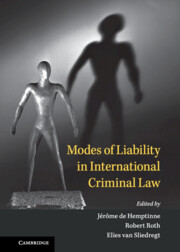Book contents
- Modes of Liability in International Criminal Law
- Modes of Liability in International Criminal Law
- Copyright page
- Contents
- Biographies
- Acknowledgements
- Abbreviations
- 1 Cross-Cutting Issues
- Part I Individual Commission
- Part II Joint Commission
- Part III Participation
- 7 Aiding and Abetting
- 8 Instigation
- 9 Ordering
- Part IV Participating in Group Activities
- Part V Inchoate and Preparatory Acts
- Part VI Other Forms of Responsibility
- Part VII Concluding Observations
- Index
- References
8 - Instigation
from Part III - Participation
Published online by Cambridge University Press: 01 July 2019
- Modes of Liability in International Criminal Law
- Modes of Liability in International Criminal Law
- Copyright page
- Contents
- Biographies
- Acknowledgements
- Abbreviations
- 1 Cross-Cutting Issues
- Part I Individual Commission
- Part II Joint Commission
- Part III Participation
- 7 Aiding and Abetting
- 8 Instigation
- 9 Ordering
- Part IV Participating in Group Activities
- Part V Inchoate and Preparatory Acts
- Part VI Other Forms of Responsibility
- Part VII Concluding Observations
- Index
- References
Summary
According to the Oxford English Dictionary, the verb ‘to instigate’ means ‘[t]o spur, urge on; to stir up, stimulate, incite, goad (now mostly to do something evil)’ or ‘[t]o bring about by incitement or persuasion; to stir up, foment, provoke’. It appears then that, in common language, instigation carries the negative connotation of influencing somebody to do something bad or inadvisable. And indeed, similarly, the concept of instigation has been applied in the prosecution of international crimes in order to capture the criminal responsibility of those who, even though not carrying out any elements of the crime themselves, have psychologically prompted other people to perpetrate such crimes. In international criminal proceedings, the same idea has also been expressed with concepts like soliciting and inducing, or incitement.
- Type
- Chapter
- Information
- Modes of Liability in International Criminal Law , pp. 257 - 283Publisher: Cambridge University PressPrint publication year: 2019
References
Select Bibliography
- 1
- Cited by

